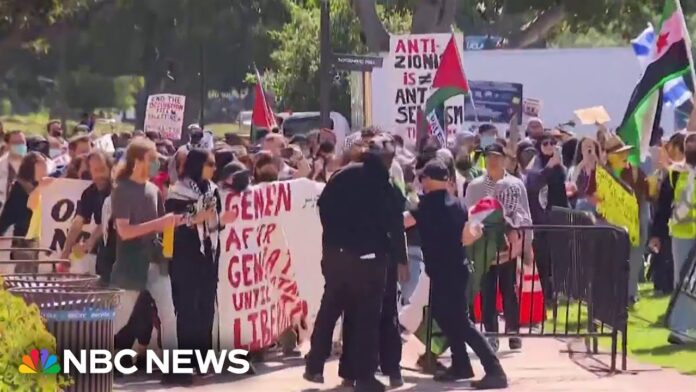Students arrested in clashes over Israel-Gaza war as protests spread across U.S. campuses
As the Gaza conflict continues to escalate, protests have erupted in nationwide university campuses in the U.S., drawing attention to the deep divisions and strong sentiments surrounding the Israel-Palestine issue. These protests have led to hundreds of student arrests, with significant confrontations occurring at institutions like the University of California, Los Angeles (UCLA). The demonstrations, primarily organized by pro-Palestinian student groups, have seen increasing participation and have been met with substantial police presence, including the use of chemical irritants and Tasers to disperse protestors. The situation has grown more volatile with incidents of scuffles and physical altercations between pro-Palestinian and pro-Israeli demonstrators, notably at UCLA. This report delves into the ongoing situation, exploring the various facets of the demonstrations, the responses from university administrations, and the broader implications for campus policies and national discourse.
Al Jazeera
Al Jazeera’s report highlights a dramatic escalation in student-led protests across the U.S., responding to the ongoing war in Gaza. The focus of these demonstrations is on advocating for a ceasefire and urging universities to divest from companies with ties to Israel. At UCLA, the tension reached a peak when barriers intended to separate pro-Palestinian and pro-Israel groups were breached, leading to direct confrontations. According to Al Jazeera, these protests are not isolated incidents but part of a broader, national movement that has gained momentum, spreading to major universities from coast to coast. The coverage points out that while some campuses experienced violent clashes, others saw large, yet peaceful gatherings, underscoring the varied nature of the protests. University administrations, as reported, are struggling to manage these demonstrations, balancing safety concerns with the need to uphold freedom of expression. The article provides a detailed account of the incidents, including statements from university officials who express dismay over the violence and a commitment to fostering dialogue.
Fox News
Fox News portrays the protests in a different light, focusing on the antisemitic undertones that have surfaced at some of the demonstrations. Their coverage emphasizes the narrative of rising antisemitism on college campuses, a point of view that aligns with concerns expressed by some community members and political figures. According to Fox News, the protests have led to significant disruptions on campuses, affecting academic schedules and leading to heightened security measures. The report discusses the arrests made at various universities, highlighting the challenges faced by law enforcement in maintaining order. The coverage from Fox News also touches upon the political implications of the protests, noting how they have drawn attention from national leaders and influenced public debate over U.S. foreign policy and campus free speech.
AP News
AP News offers a historical perspective by comparing the current protests to those at Columbia University in 1968, known for student activism. The report draws parallels between past and present, suggesting that the spirit of protest seen at Columbia has been a recurring theme in the university’s history, influencing other campuses over the decades. AP’s coverage delves into the reasons behind the protests, the demands of the students, and the administrative responses, providing a comprehensive overview of the complexities involved. The article includes personal stories from students who feel compelled to engage in activism, reflecting a continuity of commitment to social and political causes among the student body across generations. This historical context enriches the understanding of the current unrest, highlighting the enduring nature of student activism in response to global and national issues.
The Hill
The Hill focuses on the specific events at UCLA, where the protests have been particularly intense. The report details the measures taken by the university to prevent escalations, such as erecting barriers between conflicting groups, which ultimately failed to prevent outbreaks of violence. The Hill’s coverage underscores the administrative challenges in managing such protests and the broader implications for campus policies on free speech and peaceful assembly. The article also discusses the broader national response, including political reactions and the impact of these protests on public opinion and policy discussions related to the Middle East conflict. This coverage presents a microcosm of the national wave of demonstrations, offering insights into the dynamics at a single campus while also reflecting broader trends.
